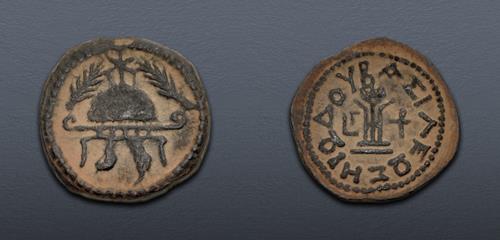
|
JUDAEA, Herodians. Herod I (the Great). 40-4 BCE. Æ Eight Prutot (23mm, 8.06 g, 1h). Mint in Samaria (Sebaste?). Dated RY 3 (38/7 BCE).
Triton XXV
Lot: 376. Estimated: $ 1 000
Greek, Bronze, Coin-in-Hand Video
Sold For $ 1 700. This amount does not include the buyer’s fee.
Go to Live
|
|
JUDAEA, Herodians. Herod I (the Great). 40-4 BCE. Æ Eight Prutot (23mm, 8.06 g, 1h). Mint in Samaria (Sebaste?). Dated RY 3 (38/7 BCE). Ornate helmet; palms flanking / HPΩΔOY BAΣIΛEΩΣ, tripod; LΓ (date) to left, monogram to right. A&F Type 1, dies O16/R68; Meshorer 44c (same obv. die); Hendin 6204; RPC I 4901; HGC 10, 651; DCA 804; Bromberg 20–1; Shoshana I 20095; Sofaer 1–7; Spaer 68. Earthen dark brown surfaces. VF. Exceptional strike on a broad flan.
From the Father & Son Collection. Ex Fontanille 69 (8 January 2015), lot 3.
Lasting from roughly 40 BCE to CE 95, the Herodian dynasty of Judaea was established by Herod I, a vassal ruler of the Roman Empire. Born to an assimilated Jewish Idumenean family and advisors to the Hasmonean dynasty, Herod was declared king in 40 BCE by the Roman Senate and the Triumvirate under Mark Antony, and later by Augustus (though it would not be until 37 BCE that Herod would actually possess a kingdom). Herod was a jealous, polarizing ruler particularly notable for his historical proximity to the life of Jesus, and is mentioned numerous times in the Bible: “...Jesus was born in Bethlehem of Judaea in the days of Herod the king…” (Matthew 2:1). As David Hendin writes, “While Herod was undeniably Jewish, he was less popular with Jews than with the Romans. Inside his own nation, Herod was considered cruel, vengeful, and power-hungry.” He oversaw enormous public works projects during his reign, more than doubling the size of the Temple Mount and renovating the Second Temple. Furthermore, as Hendin continues, “Members of the dynasty Herod founded became official and unofficial spokesmen for the Jewish people not only in their kingdom, but throughout the ancient world. The influence of Herod and his descendants continued to affect decisions by the imperial court in Rome for more than a century.”
Herodian coinage, a robust and varied series in Judaean numismatics, is most notable for some of its later issues, which can be considered some of the earliest Roman provincial coinage in Judaea. One coin, struck under Agrippa I, goes so far as to depict Agrippa and Herod of Chalcis crowning Claudius with a wreath as a translated legend reads “A vow and treaty of friendship and alliance between the Great King Agrippa and Augustus Caesar, the Senate and the People of Rome.” Due to its importance in the history of Roman provincial coinage, some coinage of the later dynasts in the Herodian line will be made available in the Roman provincial portion of this auction.
The final winners of all Triton XXV lots will be determined at the live public sale that will be held on 11-12 January 2022. Triton XXV – Session Two – Greek Coinage (Part 2) through Roman Provincial Coinage will be held Tuesday afternoon, 11 January 2022 beginning at 2:00 PM ET.
Winning bids are subject to a 20% buyer's fee for bids placed on this website and 22.50% for all others.
We recognize that our users may have various Internet Browsers and Operating Systems. We like our visitors to have the best possible experience when using our bidding platform. However, we do recognize that it is impossible to develop applications that work identically, efficiently and effectively on all web browsers. The CNG bidding platform supports the latest stable major version and the stable previous version of Mozilla Firefox and Chrome.
|
